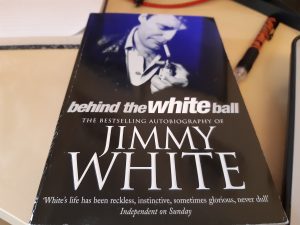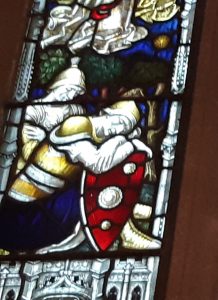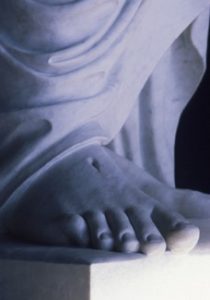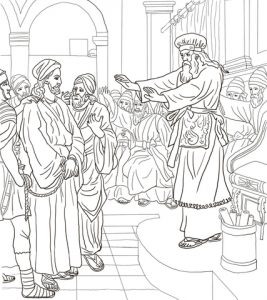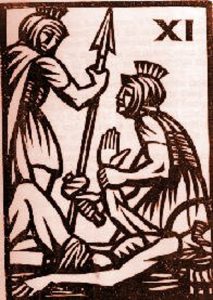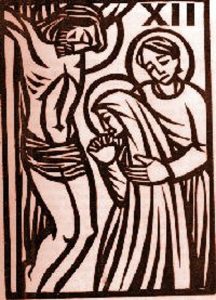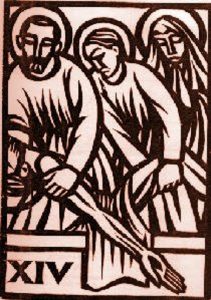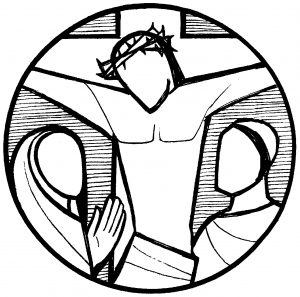Acts 2.14a,36-41, Luke 24:13-35
To see and hear https://youtu.be/MtJd-dh2Wmw
In the name of the Living God: Loving Father, Risen Son and ever present Holy Spirit, Amen
Nestling on my bookshelves is this book – Behind the white ball. This is quite unusual because I am not a big reader of biographies or autobiographies (my taste in leisure reading is more thrillers, cookery and craft books!). But it does give a clue to one of my major passions (as do my current felines!) – Watching the snooker. I was not surprised but very sad when this year’s snooker world championship was cancelled.
In recent years I have been going to Alexandra  Palace to watch the Snooker Masters in January – and I have tickets for 2021.. Fingers crossed. Back in the year 2000, as a millennium present to myself, I saw snooker live for the first time, at the crucible – where they hold the world snooker championships. Over 3 very happy days I enjoyed all things associated with snooker. I got to see most of my heroes including the beloved Jimmy….
Palace to watch the Snooker Masters in January – and I have tickets for 2021.. Fingers crossed. Back in the year 2000, as a millennium present to myself, I saw snooker live for the first time, at the crucible – where they hold the world snooker championships. Over 3 very happy days I enjoyed all things associated with snooker. I got to see most of my heroes including the beloved Jimmy….
In case you are wondering what this has got to do with our bible story. All will shortly be revealed. Anyway back in the year 2000 – In one of the matches I was on the front row – down the long side of the table. Watching the legend that is Steve Davis playing a very young and diminutive Graham Dott. I was pretty convinced I was close enough to the action to be clearly visible in the TV coverage…. Various people in my friends and family knew I was there, and were watching out for me, but sadly none of them spotted me in the crowd…..
I was a bit surprised by this after the event – that even in that particular match – when I was right next to the table, I hadn’t made it into the TV coverage. I just put it down to experience really, and didn’t think any more about it.
However a couple of months later I went to see some friends who I don’t see very often. Friends who I am pretty sure had no idea I really liked watching snooker. One of their children, Daniel looked at me and said – Did you go to the crucible this year?
I was amazed – Daniel went on to explain how convinced he had been that I was watching the snooker in the audience. Sure enough it was during the match between Steve Davis and Graham Dott. But the other members of his family had told him that they thought it was really unlikely.
Daniel saw me and recognised me (even when others were adamant he was wrong!). Daniel did this – even though others who knew me far better than him and knew I was there didn’t spot me.
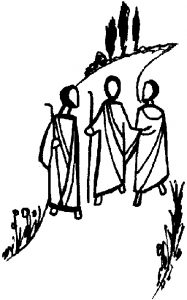 These moments of seeing and recognising – really tie into the resurrection appearance we heard as our gospel reading this morning. Clearly when the disciples first met Jesus on the road – They saw him – But they didn’t recognise him. Even when Jesus was teaching them all about what he had said to them before his crucifixion they didn’t recognise him.
These moments of seeing and recognising – really tie into the resurrection appearance we heard as our gospel reading this morning. Clearly when the disciples first met Jesus on the road – They saw him – But they didn’t recognise him. Even when Jesus was teaching them all about what he had said to them before his crucifixion they didn’t recognise him.
https://www.youtube.com/watch?v=dmmTWQn95xQ
When the BBC dramatised the passion in 2008, how they told this particular story really brought it to life. The way they did it had the emmaus 2 storming off in a real huff from the upper room. Leaving all the other disciples there.. This happened just after Mary had come back and said she had seen or more keenly felt it was Jesus – though the person she had seen had not looked like Jesus
After a scene with Caiaphas and Joseph of Arimathea, the action cut back to the Emmaus 2 having a route march, across some barren countryside. They are joined by a character who is serene and calm, but challenging and inspiring. The character is clearly not visually recognisable as Jesus. They discuss the events of the past few days and as they draw close to Emmaus, one of the Emmaus 2 invites the man to share their meal.
At dinner, the man who looked different from Jesus but was him breaks bread and pours out the wine, echoing both the action and the words spoken by Jesus at the Passover meal. When the Emmaus 2 look up, it is now clearly Jesus they see holding the cup of wine.
We then cut to them returning to the other disciples saying what happened (we can only hear this in the clip). This must have been some time later – though you don’t get this impression entirely, but they would have to have walked the tough route march back.
Back with the Emmaus 2 – they recognised Jesus eventually – when he broke bread and shared wine with them. He did something deeply familiar and personal to them, and then they saw and they recognised. We need to think about what we see when we look to Jesus and what we recognise. Seeing that Jesus died and rose again, and remembering the events of the first Good Friday and the first Easter Day is one thing. But as Christians it is much more important that we do more than just see.
We need to recognise that Jesus died and rose again, and apply what that means to us to our lives. Because in recognising we begin to understand how important Jesus is to us and that this world changing act is what the Christian faith is all about. As we understand even more how much God loves us, and how we need to share that love with others.
That must be a priority in our lives. That priority is also clearly shown in Jesus example here. Just think for a moment. What Jesus was wanting to do as the Emmaus 2 stormed away from the upper room? Jesus was wanting to appear to the disciples all together (in the upper room in Jerusalem being an ideal spot!) and then confer the power of the Holy Spirit on them. Yet at this very point the Emmaus 2 had stormed off, here we have 2 of them going away from Jerusalem, and walking about 8 miles – most of the way from Wincanton to Sherborne for example…
It is really interesting what happens here – Jesus could have told them straight away who he was, and got them to return with him to the other disciples. But he didn’t do that – He could have saved himself a lot of time and significant effort, – walking and explaining. He took the time and made the effort to get them to understand more clearly for themselves. He walked for miles and miles and in completely the wrong direction, and used energy and time to walk them through his story and his role in it once more.
Some times when we are sharing the good news of our faith with others and are praying for them. It can feel like everything is going in completely the wrong direction. Jesus example, here is very pertinent. These disciples were going in the wrong direction – but Jesus went with them. We need to reflect on his example in how we approach sharing our faith with others. Sometimes when we are sharing the good news of our faith with others, it can also feel like we are not getting anywhere or getting anywhere fast. Jesus again gives an example of patience and determination, and one where he was willing to devote significant time and exert significant energy in getting them to understand better. We would do well to follow this example in how we go about this.
From all of this we can be clear that though seeing Jesus as part of our lives is important. Recognising and acting on his love for us is much more important. It is our actions, which will speak of our love for Jesus. And even when it feels like we are going in the wrong direction, when we share our love of God with others. Jesus example shows us, we must keep going and persevere.
In our lock-downed society which needs meaning and purpose, we need to persevere in sharing the good news of hope. Seeing Jesus, yes and more importantly living lives characterised by deep recognition – recognising his amazing love for us. I am going to end with a prayer – let us pray
Lord Jesus, as you walked on the road to Emmaus, walk with us on the roads we travel. Help us to know your presence with us, and to be your presence to others. In lockdown or in freedom be the wind in our sails – to share your amazing love with others and help us to persevere. Amen
References
Prayer adapted – copyright © rootsontheweb.com
BBC – The Passion http://www.bbc.co.uk/thepassion/about/

